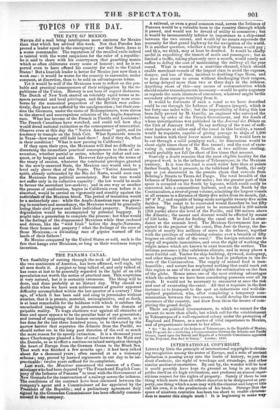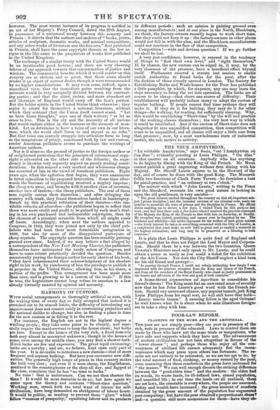INTERNATIONAL COPYRIGHT.
LirrLE by little the principle of international copyright is obtain- ing recognition among the states of Europe, and a relic of ancient barbarism is passing away into the limbo of history, to join the droit d'aubaine, the right of wreckage and Strandage, and other similar mediarval enormities. By and by, the wonder will be how it could possibly have kept its ground so long in an age that prides itself on its high civilization, and professes an almost super- stitious respect for the rights of property. Surely if there be one thing which more than all others deserves to be designated as pro- perty, one thing which a man may with the clearest and largest title call his own, it is the productions of his brain. Strange that the space of nineteen centuries has been too short to enable christen,. dom to master this simple truth I It is beginning to make way' however. The most recent instance of its progress is notified in an act of her Majesty's Privy Council, dated the 27th August, in pursuance of a reciprocal treaty between this country and Prussia : it directs that the authors and makers of" books, prints, articles of sculpture, dramatic works, and musical compositions, and any other works of literature and the fine arts," first published in Prussia, shall have the same copyright therein as the law as- signs in the like cases to the proprietors of works first published in the United Kingdom.
The exchange of a similar treaty with the United States would be an inestimable good fortune ; and there are very cheering tokens of our approach towards that consummation of justice and wisdom. The commercial benefits which it would confer on this country are so obvious and so great, that these alone should render it an object of earnest desire, though it were recommended by no higher considerations. It may even seem, indeed, upon a superficial view, that the immediate gains resulting from the measure would be very unequally divided between the contract- ing parties ; and that the older, richer, and more abundant art and literature of England would carry off the lion's portion. But the bolder spirits in the United States think otherwise ; they aspire to create for themselves a national literature without which they contend that the Union itself cannot stand. "Let us have home thoughts," says one of their writers; "or let us cease to live. This is the cry and the necessity of all nations that would endure either in the business or the memory of man- kind. Let us determine to have a voice of our own in our litera- ture, which the world shall listen to and regard as no echo." But that voice can scarcely struggle into articulate form so long as the temptations of piracy, sanctioned both by law and custom, render American publishers averse to purchase the writings of American authors.
Nor is it alone on the ground of justice to the foreign author or of enlightened patriotism that the principle of international copy- right is advocated on the other side of the Atlantic its expe- diency is likewise very cogently argued on purely trading consi- derations. In this respect a very marked and wholesome change has occurred of late in the views of American publishers. Eight years ago, when the agitation first began, they were unanimous in bitter opposition to the proposed innovation. Some time after- wards the business of republishing received a mighty impetus ; the cheap 'era arose, and brought with it another class of interests, another race of traders,—the cheap publishers. The zeal of these men rapidly outran their discretion ; and after deluging the country with trash, they found themselves landed in bankruptcy. Struck by this practical refutation of their theories—this ine- vitable reductio ad absurdum—the publishers began to reflect that there was more credit and profit to be gained by each man's deal- ing in his own purchased and indisputable copyrights, than by the chances of a piratical scramble from which all might come off losers. Accordingly, when next the authors appealed to Congress, in 1844, they were joined not only by the chief pub- lishers who had been their most formidable antagonists in 1838, but also by most of the disappointed purveyors of cheap reprints. The copyright question has been steadily gaining ground ever since. Indeed, if we may believe a fact alleged by a correspondent of the Nero York Morning Courier, the publishers themselves have anticipated the tardy action of Congress, and have to some extent practically decided the question. Besides occasionally paying the foreign author for early sheets of his book, "they have consummated their acknowledgment of his absolute right in his work, by purchasing of him the privilege to publish it in perptuo in the United States; allowing him, as his share, a portion of the profits. This arrangement has been made more than once, and is growing to be a custom of the trade." If this be true, the Legislature cannot long refuse its sanction to a law already virtually enacted by opinion and necessity.



























 Previous page
Previous page